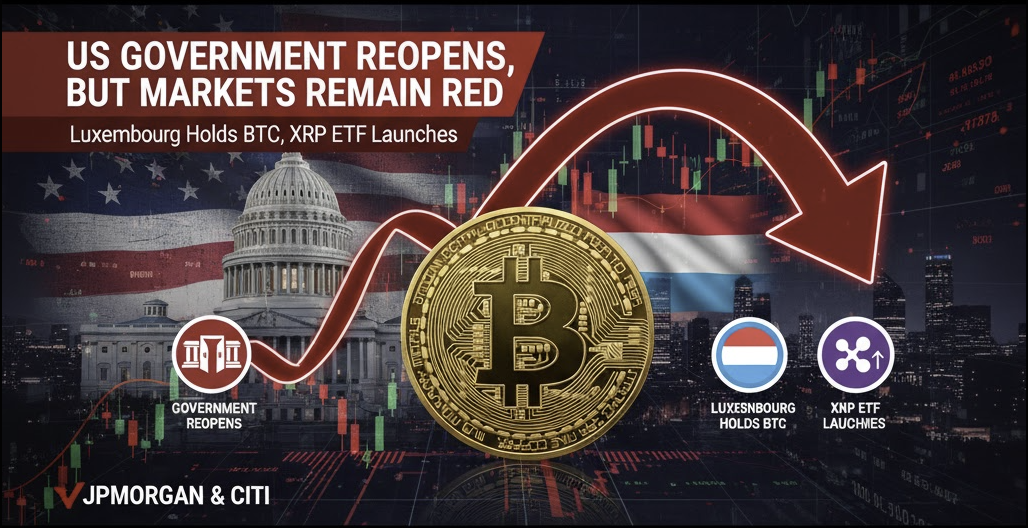Market Overview
On Wednesday (06/05), U.S. stock markets closed lower across all three major indices, with the Dow Jones falling the most at 0.95%. Futures contracts also declined, reflecting growing investor caution amid economic uncertainty. Gold remained elevated at $3,395 per ounce, while crude oil edged up to $59.6 per barrel, suggesting continued inflationary pressures.

Bitcoin, however, defied the broader market trend, surging to $97,000. This rally came as the cryptocurrency market regained momentum, pushing total market capitalization to $3.107 trillion. Despite the gains, most major altcoins saw mixed performance, highlighting Bitcoin's dominance in the current market cycle.

Notably, Bitcoin spot ETFs recorded net outflows of $85.7 million on the same day, while Ethereum spot ETFs also reported negative net flows of $17.9 million. This indicates ongoing profit-taking among institutional investors, even as retail interest remains strong.

Tariff Negotiations and Economic Impact
U.S. Treasury Secretary Scott Bessent recently testified before the House Appropriations Subcommittee, confirming that the United States is actively negotiating trade deals with 17 of its 18 major trading partners. However, Bessent clarified that no formal talks have yet commenced with China, contradicting earlier statements from President Trump, who suggested ongoing discussions.

Shortly after Bessent's remarks, Chinese officials confirmed that trade talks with the United States are set to begin this week. U.S. Treasury Secretary Bessent is scheduled to meet with Chinese Vice Premier He Lifeng on Thursday, while U.S. Trade Representative Jamieson Greer will engage with his Chinese counterpart on Friday.
The rapid escalation in trade negotiations comes as both sides seek to stabilize their economies amid growing global uncertainty. However, significant challenges remain, including resolving tariffs that have disrupted global supply chains and weighed heavily on corporate earnings.
Impact on Chinese Corporations
Chinese companies like Temu and Shein are already feeling the strain. The recent closure of the "de minimis" loophole, which previously allowed duty-free imports of up to $800 per day, has forced these companies to absorb massive tariff costs. Shein and Temu now face potential tariffs as high as 120%, along with flat fees of $100 per shipment, set to increase to $200 in June.
In response, both companies have ramped up advertising in Europe, with Shein increasing its ad spend by 35% in France and the UK in a desperate bid to offset U.S. losses. However, given the size and spending power of the U.S. market, this strategy may offer limited relief.
U.S. exporters are also under pressure, with the number of containers shipped to China plummeting from 22,320 in March to just 5,170 in April. While U.S. exports to China are smaller in volume, they are concentrated in high-value sectors like agriculture, making them particularly vulnerable to prolonged trade tensions.
India and Canada in Trade Focus
Canadian Prime Minister Mark Carney recently met with President Trump, emphasizing Canada's commitment to maintaining its economic independence. Meanwhile, Indian Trade Minister Piyush Goyal noted that trade talks with the United States are progressing well, with both sides exploring mutual benefits. Goyal reiterated India's ambition to become a $35 trillion economy by 2047, highlighting the strategic importance of U.S.-India trade relations.
However, finalizing these agreements may take months, with the earliest possible deal expected this fall. This leaves a gap in the global trade landscape, potentially delaying economic recovery as nations seek to realign their trade networks.
New Hampshire Establishes Bitcoin Reserve Fund
In a surprise move, New Hampshire has become the first U.S. state to authorize the investment of public funds in Bitcoin. Governor Kelly Ayotte recently signed HB302 into law, allowing up to 10% of the state's general fund and other authorized funds to be allocated to digital assets, provided they have a market capitalization of at least $500 billion — effectively limiting this to Bitcoin for now.
The bill also sets stringent custody requirements, mandating that assets be held through regulated custodians or state-managed entities. This move positions New Hampshire as a pioneer in integrating digital assets into public finance, potentially setting a precedent for other states.
Meanwhile, similar bills in Florida (HB 487 and SB 550) aimed at establishing a state-managed Bitcoin reserve fund failed to pass, reflecting the ongoing debate over the role of digital assets in public finance.
Ethereum's Pectra Upgrade
Ethereum is set to launch its highly anticipated Pectra upgrade on May 7, combining two major hard forks — Prague (execution layer) and Electra (consensus layer). This update includes 11 Ethereum Improvement Proposals (EIPs) aimed at improving scalability, security, staking efficiency, and developer tools.

Key improvements include:
- EIP-7251: Increases validator staking limits from 32 ETH to 2,048 ETH, reducing network congestion and enhancing performance.
- EIP-7702: Introduces account abstraction for standard wallets (EOAs), enabling advanced features like gasless transactions and bundled payments.
- EIP-7742 & 7691: Expands blob storage by 50%, reducing transaction costs and improving Layer 2 scalability.
- EIP-6110 & 7002: Streamlines staking operations, reducing security risks and shortening validator onboarding times.
Node operators are required to update their clients to support the Pectra upgrade, while regular ETH users do not need to take any action.
Conclusion
As global economic conditions remain volatile, the role of Bitcoin as a hedge against financial instability continues to gain traction. With U.S.-China trade talks resuming and regulatory clarity improving, the path forward for digital assets is becoming clearer. However, the road ahead remains uncertain, with both economic and political factors shaping the next phase of the crypto market's evolution.
Disclaimer
This article is for informational purposes only and does not constitute financial advice. Always conduct your own research before making investment decisions.


.png)





